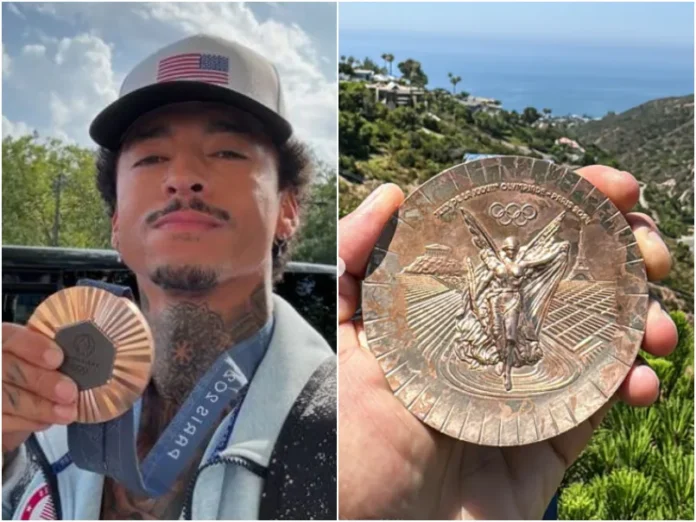
Professional skateboarder Nyjah Huston, a renowned figure in the skateboarding world, recently celebrated a significant achievement at the Paris 2024 Olympics by securing his first-ever Olympic medal, a bronze, in the men’s street event.
However, the joy of this victory was overshadowed when Huston discovered that the quality of his medal was subpar.
Huston took to Instagram to share his disappointment, stating, “These Olympic medals look great when they’re brand-new. But, after letting it sit on my skin with some sweat for a little bit and then letting my friends wear it over the weekend, they’re apparently not as high quality as you’d think. … It’s looking rough.”
His remarks, quoted by ESPN, quickly spread, drawing attention to a potential issue with the medals awarded at this year’s Games.
The skateboarder’s concerns did not go unnoticed by Olympic organizers. According to a report by the Daily Mail, a spokesperson for Paris 2024 acknowledged the issue, stating, “Paris 2024 is aware of a social media report from an athlete whose medal is showing damage a few days after it was awarded.”
“We are working closely with the Monnaie de Paris, the institution tasked with the production and quality control of the medals, and together with the National Olympic Committee of the athlete concerned, in order to appraise the medal to understand the circumstances and cause of the damage.”
The Monnaie de Paris, responsible for minting the medals, is now under scrutiny as officials investigate the cause of the damage. The response from Paris 2024 organizers suggests a commitment to resolving the issue and ensuring that the medals meet the high standards expected at the Olympics.
The spokesperson added that they are working diligently to assess the situation and will take appropriate action once the investigation is complete.
Huston’s experience highlights a broader concern for athletes who dedicate years of training and effort to compete at the Olympics, only to face disappointment with the quality of their awards. The significance of an Olympic medal goes beyond its physical appearance; it symbolizes the pinnacle of athletic achievement and is a cherished memento for those who earn it.
The incident has sparked discussions about the quality control processes in place for Olympic medals and whether current standards are sufficient. Athletes and fans alike are watching closely as the investigation unfolds, hoping for a resolution that upholds the prestige and integrity of the Olympic Games.
As the Paris 2024 organizers work to address this issue, the situation serves as a reminder of the importance of meticulous quality control in preserving the honor and recognition associated with Olympic achievements.
For now, Nyjah Huston and other athletes who may be affected by this issue await further updates on the measures being taken to rectify the situation and ensure that their hard-earned medals are of the highest quality.
The ongoing investigation and the response from Olympic officials will be crucial in maintaining the trust and confidence of athletes and the global sports community in the integrity of the Olympic Games and its awards.